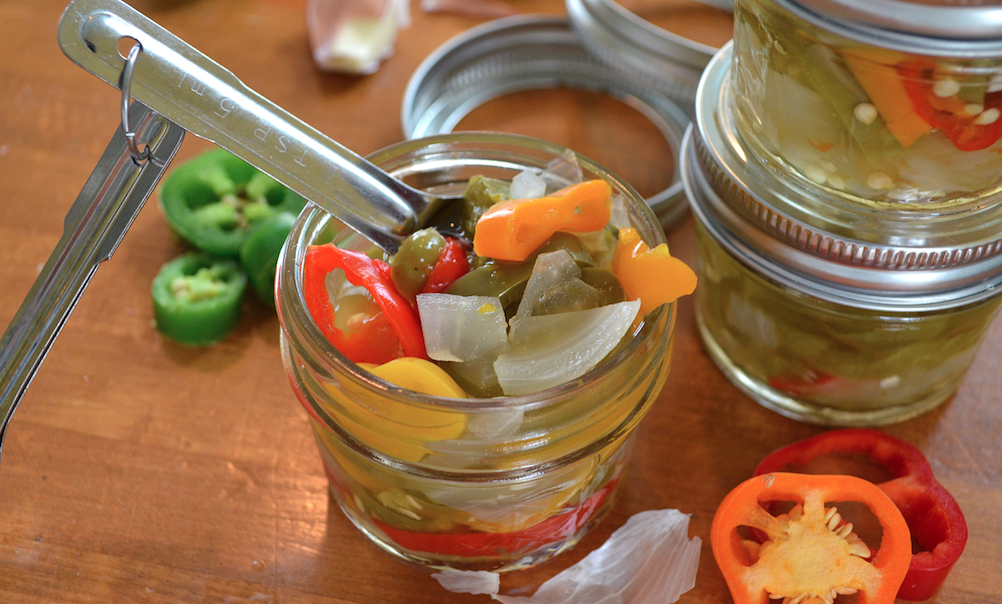Life Preserver
“We mostly use things people can grow in their own gardens at home,” she says. “Tomatoes, cucumbers, squash, jellies, jams, conserves—whatever someone wants to preserve, we can do it.” - Joyce L. Moore
Joyce L. Moore isn’t just preserving food. She’s preserving her family’s history.
Growing up, the Edwards-Moore family kept chickens and ducks and gardened. They turned to preserving as a way to augment their income and to enjoy the fruits of their labors year round. From age 10, Moore pitched in to help.
“I love to garden, and preserving is just something I’ve always done,” she says. “My grandmother used to do it, and had a grapevine that she used to make jelly. I can still remember harvesting the grapes, and the good smells in the kitchen.”
Now owner of her own real estate company, Moore also happily shares her gardening and preserving knowledge with new generations through her role as director and programs manager of Urban Patch. Founded in December 2011, the family owned and operated enterprise seeks to improve inner city culture by turning vacant properties into useable neighborhood-focused growing spaces that provide fresh, healthy food and ecological benefits.
Moore’s son, Justin, an urban designer and city planner in New York City, hit upon the idea to create Urban Patch after researching his father’s family history through the Indiana Historical Society and Indianapolis Recorder.
“He recognized that the concepts of teaching people how to be self-sufficient and addressing the whole person were things we should be bringing back and implementing in our communities today,” Moore says. “He wrote a paper called ‘Past Forward,’ and people were really engaged in it.”
The development of Urban Patch was modeled after what Moore’s own father-in-law, an agriculturalist during the Great Migration, was able to achieve working with Indianapolis’ Flanner House in the 1940s and ’50s. Flanner House is located just north of downtown Indianapolis and assists community members with an eye towards self-sufficiency. Urban Patch used 100 acres of inner city vacant land to educate program participants about how to grow and cook their own food.
“Part of that project was a cannery built by veterans, and they taught people about cooking, nutrition, farming and food preservation,” Moore says. “We wanted to bring that sense of community back and start teaching people how to do all this for themselves, so they don’t have to be so consumer-based.”
Thanks to Urban Patch, Indy’s local inner city communities have access to a range of healthy, locally grown fruits and vegetables including tomatoes, herbs, strawberries, cherries—even lavender.
Having earned her status as a Master Food Preserver through a Purdue Extension program (she’s also a Purdue Master Gardener), Moore teaches seasonal preserving classes through Urban Patch at Indy’s Kitchen on the near northside.
“We mostly use things people can grow in their own gardens at home,” she says. “Tomatoes, cucumbers, squash, jellies, jams, conserves — whatever someone wants to preserve, we can do it.”
Moore also points out that preserving isn’t just about hot-water-bath canning and jarring, but includes freezing, drying and fermenting as well.
“Preserving isn’t difficult to do, but some people are afraid of it or intimidated by it,” she says. “Our classes offer safety tips and allow participants to experience the preserving process firsthand and understand what to look for.”
Moore credits the current surge of renewed interest in preserving to several factors.
“Mostly, it’s a nostalgic process,” she says. “But also, people these days like to know where their food is coming from and how it’s grown. And, by preserving, you can eat from your garden all year long.”
For more information about Urban Patch and Moore’s seasonal preserving classes, visit UrbanPatch.org.




